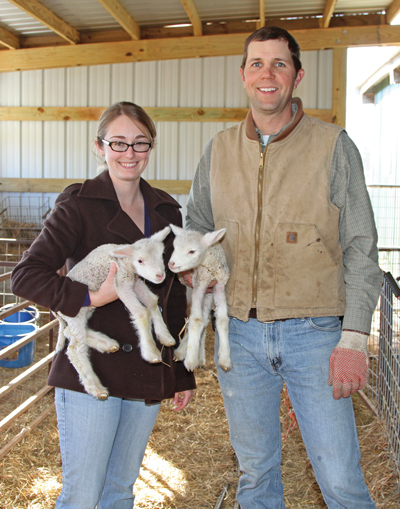Couple Shepherds Young Farmers In On-Farm Marketing

Hundreds of sheep grazing on gently rolling hills as maturing lambs play in the background may sound like a scene from Ireland or New Zealand. But this is the daily view for Franklin and Anne Randle of Lee County.
A second-generation farmer, Franklin recently took on a larger role in his family’s farm, overseeing the sheep herd originally started by his father, Frank. The couple has succeeded in on-farm marketing of their animals and is working to help other young farmers.
“To be successful at farming, you have to be passionate about it,” Franklin said. “Everybody has to eat, every day. That’s job security for all farmers.”
Sheep are the cornerstone of Randle Farms with more than 500 head on the ground after lambing season. They sell individual cuts or whole animals.
However, they’ve also raised other livestock and poultry. Before Thanksgiving 2014, the Randles sold pasture-raised turkey. Currently, Anne has a handful of dairy goats for herself, and in the past, they had pigs.
They said their most effective marketing has been online, and they encourage farmers who are just starting out to establish an internet presence with a website and social media.
“We do videos on our Facebook page where we explain different practices,” Anne said. “That helps connect people to us and makes us more transparent. There’s a lot of questions about farming today, and people make a lot of assumptions. The best way to handle that is to actually answer their questions and be open and honest.”
They said social media has also allowed them to educate customers.
“A lot of people don’t realize a lamb is more than just lamb chops,” Franklin said. “Through social media, people can feel a connection with our farm without us having to open our gates all the time.”
The Randles credit much of their success to the relationships Frank established when he started farming. They encourage first-generation farmers to build a network of reliable customers and seek wisdom and assistance from more seasoned farmers.
“Farming is hard enough without having to buy a lifetime worth of equipment when you’re 20 years old,” Anne said. “We’ve formed friendships with new farmers so we can offer advice, or let them borrow a tractor. We can also help them know what to do when an animal gets sick or a freeze is about to come.”
One way the Randles built those friendships is by opening up their farm to tour groups and speaking at conferences for various agricultural groups.
“We can all learn from each other; that’s the point of relationships,” Franklin said. “Whether it’s an all-organic farmer or someone who is completely conventional, you can learn something from both kinds of farmers.”
While Franklin is a full-time farmer, he and his dad also build fences commercially, and Anne works as an Extension specialist for Tuskegee University. Franklin said having that reliable income helps during tough times.
“There’s a lot of glory involved with farming, but there can be a lot of heartache, too,” he said. “With other jobs, we know we have the money for groceries and electric bills, no matter the challenges we have on the farm.”
The Randles are always trying something new. For the first time this year, they are selling wool yarn off the farm. They said having a diverse farming operation is important for new farmers because it also helps ensure a steady income.
“We’re not just growing one crop or one kind of animal, and we’re not selling those things to just one buyer,” Anne said. “We have a lot of things going on, so if one falls through, we’re not high and dry. This way, you have your bases covered.”
The greatest lesson the couple can impart to new farmers, though, is to be patient and persevere.
“You’re only limited by your imagination as far as marketing something,” Franklin said. “If you hit a brick wall, don’t give up. Find a different direction and go that way.”
For more information, find Randle Farms on Facebook, Instagram and YouTube.
